牛津译林版七年级上册Unit 4 My day 知识点及练习课件(共84张PPT)
文档属性
| 名称 | 牛津译林版七年级上册Unit 4 My day 知识点及练习课件(共84张PPT) |
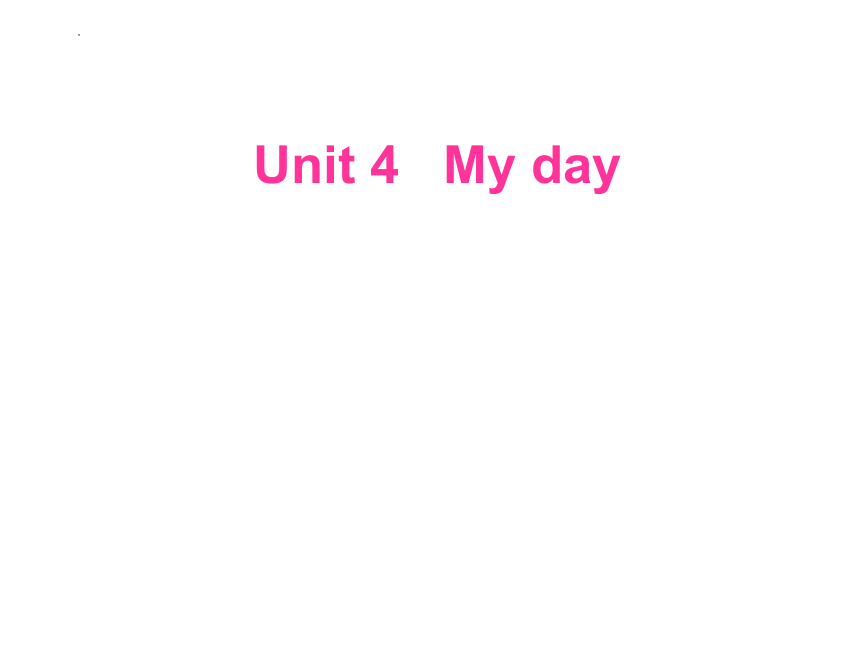
|
|
| 格式 | zip | ||
| 文件大小 | 534.5KB | ||
| 资源类型 | 教案 | ||
| 版本资源 | 牛津译林版 | ||
| 科目 | 英语 | ||
| 更新时间 | 2022-08-10 00:00:00 | ||
图片预览


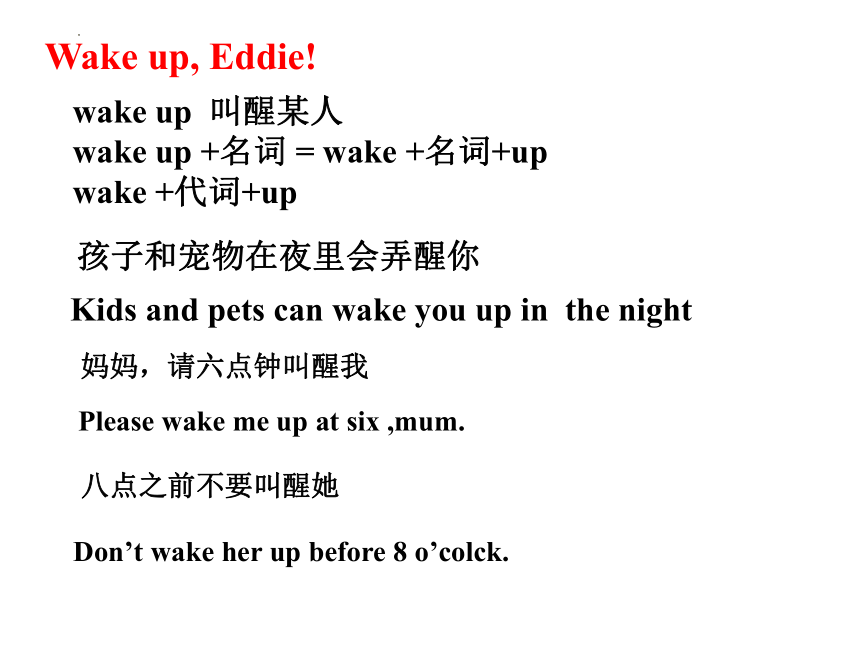
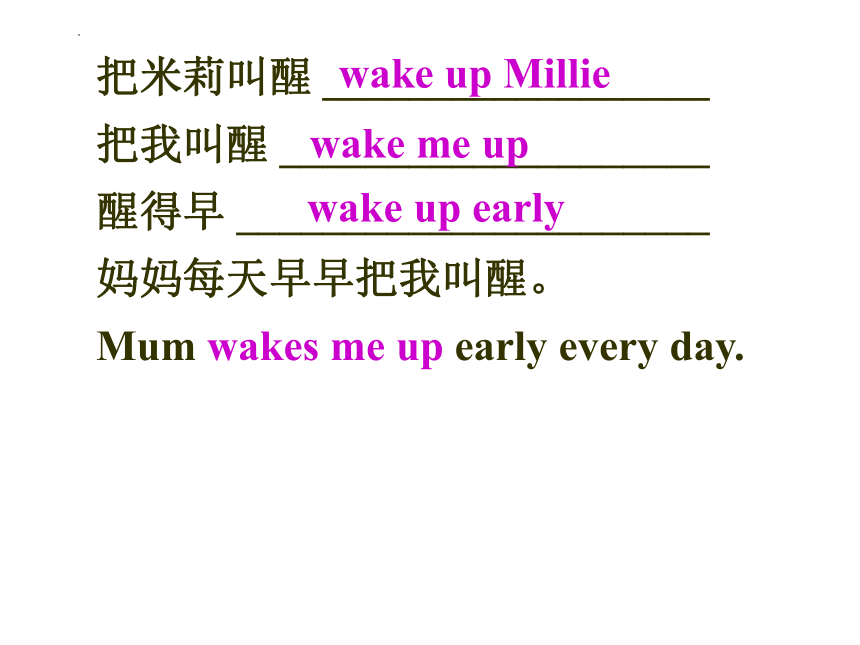
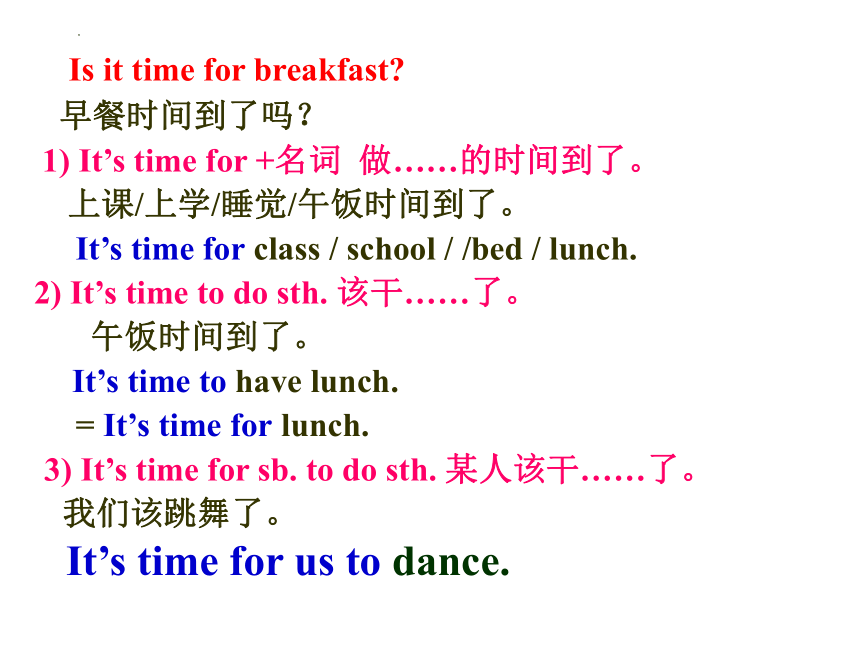
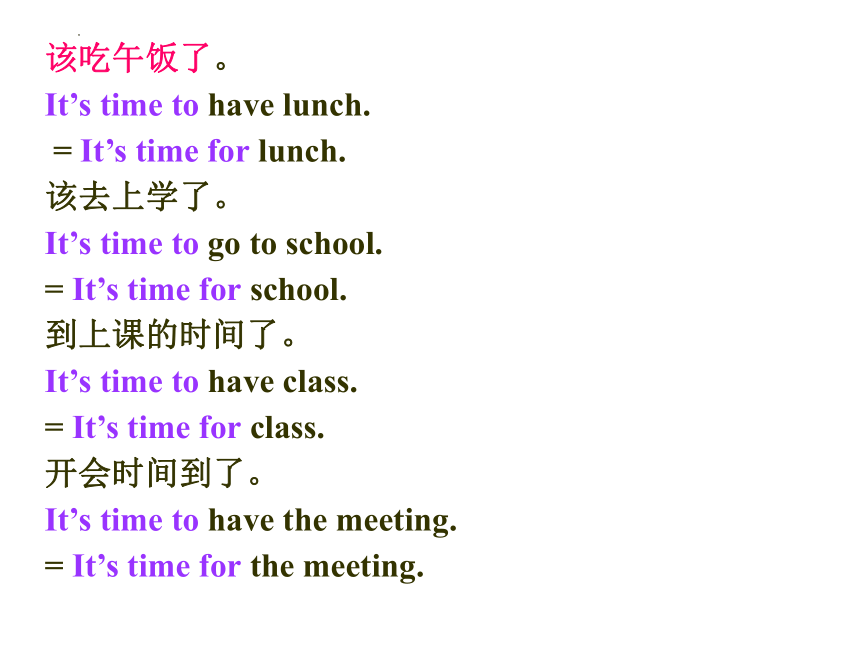
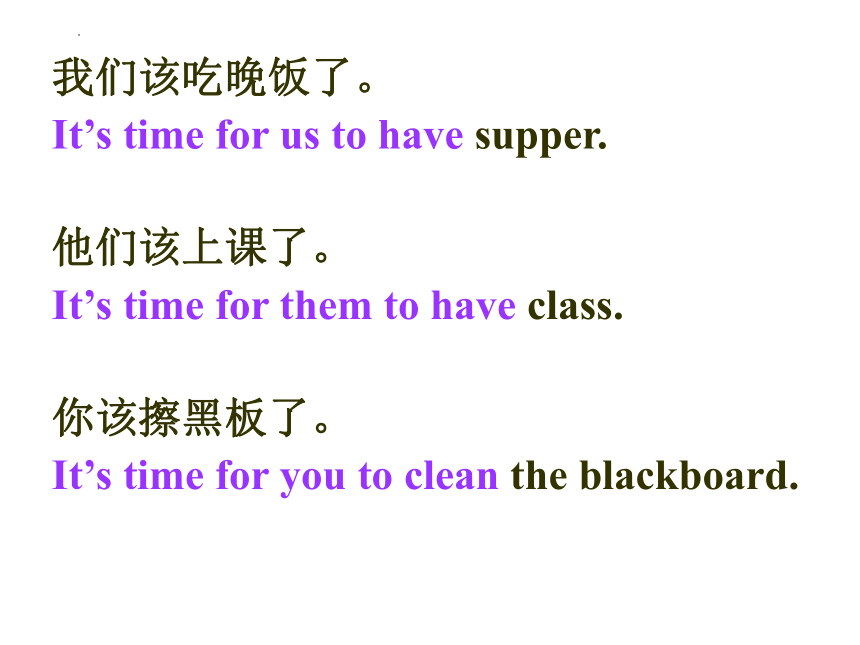
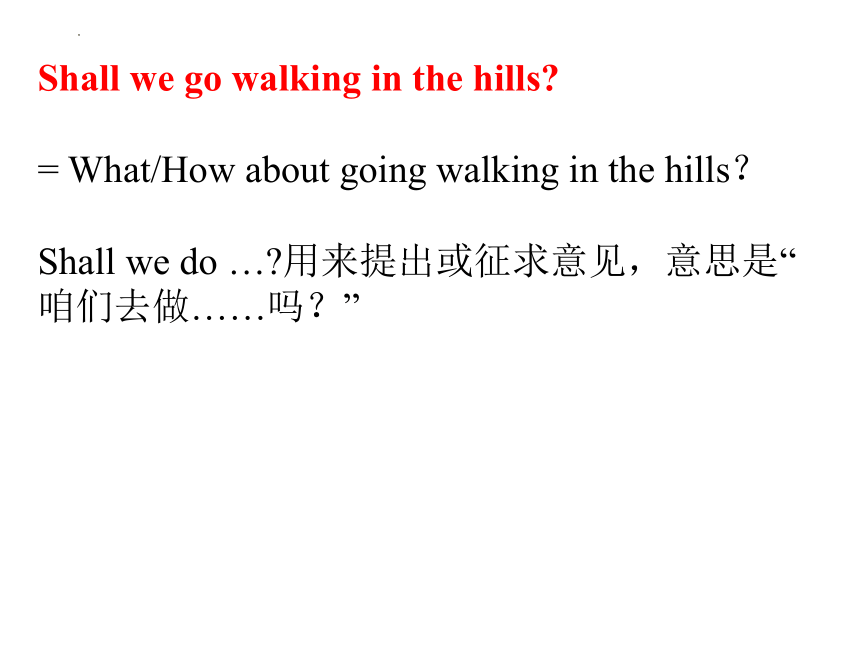

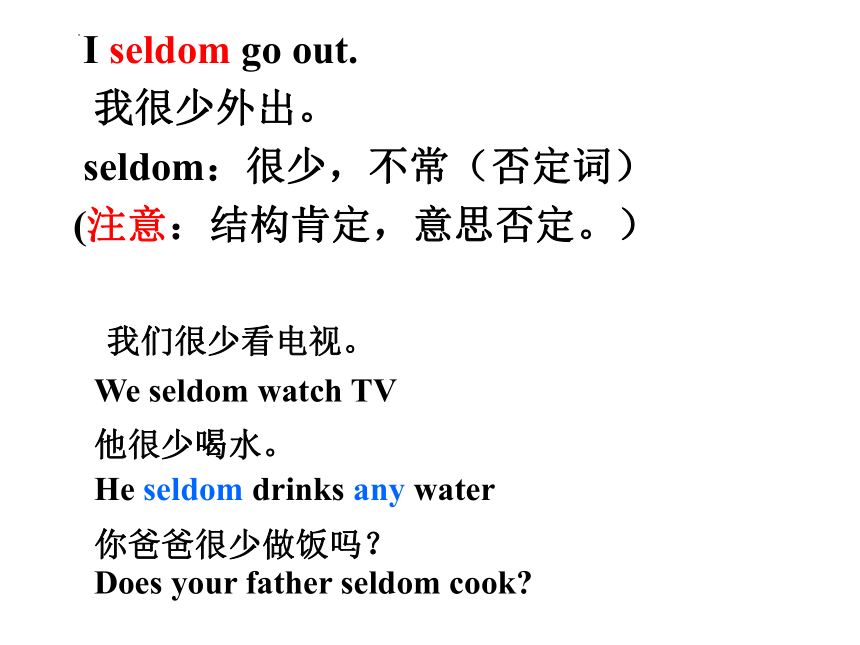
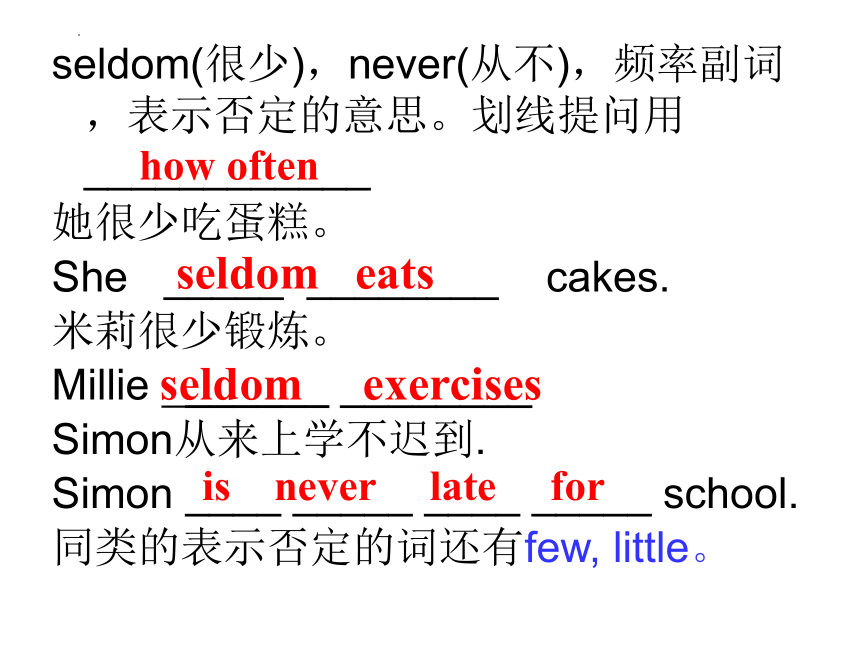
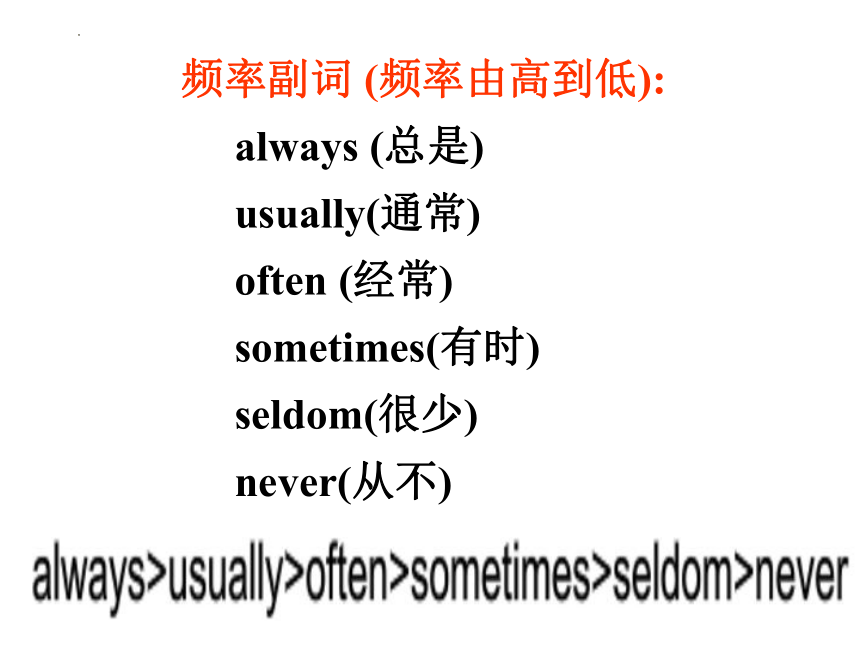
文档简介
(共84张PPT)
Unit 4 My day
Comic strip
wake up 叫醒某人
wake up +名词 = wake +名词+up
wake +代词+up
孩子和宠物在夜里会弄醒你
Kids and pets can wake you up in the night
妈妈,请六点钟叫醒我
Please wake me up at six ,mum.
八点之前不要叫醒她
Don’t wake her up before 8 o’colck.
Wake up, Eddie!
把米莉叫醒 __________________
把我叫醒 ____________________
醒得早 ______________________
妈妈每天早早把我叫醒。
Mum wakes me up early every day.
wake me up
wake up early
wake up Millie
Is it time for breakfast
早餐时间到了吗?
1) It’s time for +名词 做……的时间到了。
上课/上学/睡觉/午饭时间到了。
It’s time for class / school / /bed / lunch.
2) It’s time to do sth. 该干……了。
午饭时间到了。
It’s time to have lunch.
= It’s time for lunch.
3) It’s time for sb. to do sth. 某人该干……了。
我们该跳舞了。
It’s time for us to dance.
该吃午饭了。
It’s time to have lunch.
= It’s time for lunch.
该去上学了。
It’s time to go to school.
= It’s time for school.
到上课的时间了。
It’s time to have class.
= It’s time for class.
开会时间到了。
It’s time to have the meeting.
= It’s time for the meeting.
我们该吃晚饭了。
It’s time for us to have supper.
他们该上课了。
It’s time for them to have class.
你该擦黑板了。
It’s time for you to clean the blackboard.
Shall we go walking in the hills
= What/How about going walking in the hills?
Shall we do … 用来提出或征求意见,意思是“咱们去做……吗?”
表示提出或征求意见:
Shall I / we…
= What about doing / how about doing …
=Why not do sth?=Let’s do dth.
I seldom go out.
我很少外出。
seldom:很少,不常(否定词)
(注意:结构肯定,意思否定。)
我们很少看电视。
We seldom watch TV
他很少喝水。
He seldom drinks any water
你爸爸很少做饭吗?
Does your father seldom cook
seldom(很少),never(从不),频率副词,表示否定的意思。划线提问用____________
她很少吃蛋糕。
She _____ ________ cakes.
米莉很少锻炼。
Millie ______ ________
Simon从来上学不迟到.
Simon ____ _____ ____ _____ school.
同类的表示否定的词还有few, little。
seldom eats
seldom exercises
is never late for
how often
频率副词 (频率由高到低):
always (总是)
usually(通常)
often (经常)
sometimes(有时)
seldom(很少)
never(从不)
1. 频率副词用在be动词、助动词、情态动词后。
It is usually hot in summer.
夏天天气通常是热的。
2. 频率副词用在主要动词前。
My father usually walks home.
我的父亲经常步行回家。
提问:how often
注意:对于 every day/week/year… 提问也用 how often
频率副词在句中的位置:
翻译下列句子
1. 太阳总是从东方升起,西方落下.
The sun ________ rises in the east and sets in the west.
2. 他通常10点钟睡觉.
He _________ goes to bed at ten o’clock.
3. 他上学经常迟到.
He is _________ late for school.
4. 有时他晚饭后去图书馆.
He ___________ goes to the library after supper.
5. 莉莉不常读报.
Lily _________ reads newspaper.
6. 我上学从来不迟到.
I am ________ late for school.
often
sometimes
seldom
never
always
usually
1. Tom _____ to work by bicycle.
A. usually go B. go usually
C. usually goes D. goes usually
2. Jerry _________ for school.
A. is usually late B. usually is late
C. is late usually D. goes usually late
3. — _____ do you have a meeting
— Every Monday.
A. What time B. How often
C. How many times D. Where
C
A
B
句型转换
1.She often goes to the Reading Club on Wednesdays and Fridays.(同义句)
She goes to the Reading Club______ ______week.
2.He seldom takes a taxi to go to school.(提问)
_____ ____ ______he _____ a taxi to go to school
3.We play badminton for half an hour every day.(对划线部分提问) ___ ___ ___ ___ play badminton every day
4. Eddie walks to his bowl many times a day. (对划线部分提问)
____ _____ ______ Eddie ______ to his bowl
twice
a
How often does
take
How long do you
How often does
walk
need为实义动词
need sth 需要……东西
We always need a good rest.
我总是需要好好休息一下。
我需要一些水。
I need some water
他不需要自行车。
He doesn’t need a bike
你需要橘子汁吗?
Do you need orange juice
need (sb)to do sth 需要(某人)做某事
我需要喝一些水。
I need to drink some water.
他需要努力学习。.
He needs to study hard.
我们需要老师帮助我们吗?
Do we need teachers to help us?
你的兄弟不需要今天来。
Your brother doesn’t need to come today.
need的情态动词特征
1、无论主语是第几人称,need用原形;
2、need后接动词原形(need do);
3、否定句 needn’t;
4、疑问句把need提到主语前。
need的实义动词特征
1、need有时态和人称的变化(needs; needed);
2、need+名词;
3、need+to do;
4、否定式和疑问句借助动词do,does或did。
I need some money.(一般疑问句)
_____________________________
He needs to read this book.(否定句)
___________________________
He need clean the room.(一般疑问句)
___________________________
The boy didn’t need to wait.(陈述句)
__________________________
The boy needn’t wait.(陈述句)
_________________________________
Do you need any money
He doesn’t need to read this book.
Need he clean the room
The boy needed to wait.
The boy need wait.
Some dogs just don’t know how to have fun.
有些狗就是不知道如何找乐子。
我知道如何做一个好孩子.
I know how to be a good child.
她不知道如何打网球。
She doesn’t know how to play tennis.
疑问词+to do sth
该怎样做
How to do it.
该做什么
What to do
该去哪里
Where to go
该什么时候看电视
When to watch TV
该买哪一个
Which (one)to buy
have fun 玩的开心
fun后接doing
=have a good time = enjoy oneself
我们玩得很开心。
We have fun.
=
We have a good time.
周末Tom玩得不开心。
Tom doesn’t have fun at the weekend.
=Tom doesn’t have a good time at the weekend.
他玩得开心吗?
Does he have fun
=Does he have a good time
We have fun_______(make)cakes.
making
Welcome to the unit
Do morning exercises
exercise n. & vi. 锻炼
do morning exercises 做早操
We do morning exercises at 8.30 every day.
我们每天八点半做早操。
take / do some exercise 做锻炼
It’s good to do some exercise every day.
每天锻炼有好处。
注意:exercise表示“操、练习”是可数名词;表示“锻炼、运动”是不可数名词。
Do after school activities
activity 活动
activities (复数)
after-school activities 课外活动
do after-school activities
进行课外活动
There are many activities in our school.
我们学校的活动丰富。
Do homework
homework 家庭作业 (不可数)
do homework 做家庭作业
a lot of homework / much homework
许多家庭作业
We should do our homework first.
我们应该先做家庭作业。
housework 也是不可数名词。
at 7:20
在七点二十
At a quarter past eight .
在八点一刻
英语中的“时刻”可用两种方法:直接法和间接表示法
1)直接表示法:直接用基数词表示。
7:20______________8:50______________
seven twenty
eight fifty
2)间接表示法:
用基数词和past或to表示。
一刻钟常用a quarter , 三十分钟常用half.
(1) 当分钟数小于或等于30时
分钟数+past+整点数
6:15______________
9:30______________
a quarter past six
half past nine
(2) 当分钟数大于30分钟
(剩余)分钟数+to+(下一个)整点数
7:50(八点差十分)_______________
8:45(九点差十五分)________________
ten to eight
a quarter to nine
Do you enjoy school, Millie
米莉,你喜欢上学吗?
这里school是不可数名词,前面不加______ 或_______, 表示’上课(或上学)时间
放学________
在上学__________
我很喜欢上学。
I ________ ________ ______ ______
a
after school
be at school
enjoy school very much
the
根据所给单词的首字母或汉语意思填空,每格一词:
1.Simon likes p_______ computer games.
2. Do you eat l_____ at home or at school
3. Annie likes swimming very much, and she is a good s________.
4. Do you have f______ in the park on Sundays
5. They don’t write letters to each other.
They send e__________ to each other.
laying
unch
wimmer
un
mails
6. Ricky makes _______ (模型)planes after school.
7. My father always reads _____ (报纸)after supper.
8. My mum says we ________ (不应) watch too much TV.
9. Daniel ________ (练习)playing badminton every Friday.
10. Millie and her classmates do after- school ________ (活动) at 4 p.m. in the afternoon
model
newspapers
shouldn’t
practises
activities
1. ( ) Is it time ________class
A. to B. for C. at D. in
2. ( ) My mother _____at six o’clock every morning.
A wakes me up B. wakes up me
C. wakes up I D. wakes I up
3.( ) We must know ____________.
A. how have fun B. how to fun
C. what to have fun D. how to have fun
4.( ) Do you have _____ homework to do every day
A. a lot B. much C. many D. lots
5. ( ) What time do you begin _____ classes
A. have B. to have C. to having D. has
B
A
D
B
B
Reading
Our school starts at eight in the morning from Monday to Friday .
in the morning/ afternoon/ evening
在上午/下午/晚上
她经常在晚上做作业。
She often does her homework in the evening.
from ...to...
学校图书馆从早上九点到下午4点开放。
The school library _____ ______ _____ 9:00 a.m._________4:00p.m.
How far is it ________ Beijing ______ Shanghai
is open
from
to
from
to
Usually we do morning exercises first.
exercise用作可数名词时,常用复数形式.此时
exercise 表示 “锻炼或训练的一套动作”.也可表示”练习题”.
The students usually do morning exercises at 8:40 every day.
学生们通常每天早上八点四十做早操.
Li Ming does five maths exercises every evening.
李明每晚做五道数学题.
exercise表示“体格锻炼”的总称,是不可数名词时。
Walking is good exercise.
散步是很好的锻炼.
exercise 还可以用作动词,意为”锻炼”。
Eddie never exercises. 埃迪从来不锻炼。
完成练习:
We do eye_____________ (锻炼) to protect (保护) our eyes.
Do you often ___________ (锻炼) after school
exercises
exercise
first 用作序数词,意为“第一的”
“the / 形容词性物主代词/ 名词所有格+ first +名词”
本句中的first 是副词,意为”首先”。
I must find my bike first.
我必须首先找到我的自行车.
星期天是一周的第一天。
你必须先完成的家庭作业。
You must finish your homework first.
Sunday is the first day of a week.
each other意为”互相,彼此”,通常做动词或介词的宾语。
We should help each other and learn from each each.
我们应该互相帮助,互相学习。
Do Simon and Daniel often write to each other.
西蒙和丹尼儿经常相互写信吗
我们在学校经常互相帮助。
当我和玛丽在一起时,我们总是互相聊天。
We often help each other at school.
When I’m with Mary, we always chat with each other.
After class, we often chat with each other.
We practise after school on Wednesday afternoon.
practise 练习,操练
我们应当每天练习英语。
We should practise English every day.
practise doing sth. 练习做某事
米莉放学后和朋友一起练习打排球。
Millie practises playing volleyball with
her friends after school.
Practice makes perfect.
熟能生巧。
1.在阳光中学
2.在早上8点开始
3. 对某人友好
4.在操场上玩耍
5. 去图书馆
6.练习做某事
7.在学校有许多朋友
8. 我们学校从星期一到星期五在早上8点开始上课。
9. 通常我们首先做早操。
at Sunshine Middle School
start at eight in the morning
be nice to sb.
play in the playground
go to the library
practise doing sth.
have many friends at school
Our school starts at eight in the morning from Monday to Friday.
Usually we do morning exercises first.
10. 在星期三下午放学后我们练习。
11. 他们对我都很友好。
12.在学校里我们总是玩得开心。
13.我最喜爱的功课是英语。
14.课后,我们经常相互聊天或者在操场上玩耍
15.我们的课在8:15 开始。
We practise after school on Wednesday afternoon.
They are all nice to me.
We always have a good time at school.
My favourite subject is English.
After class, we often chat with each other or play in the playground.
Our lessons begin at 8:15
改写下列句子。
His hobby is watching TV .(同义句)
He __________ __________ TV .
2. It is time for lunch . (同义句)
It is time ________ ________ lunch .
3. He often has fun at school . (同义句)
He often _____ ____ ____ _____ at school .
4. Wake up Jim and me .( 用代词代替)
Wake _________ up .
He gets up at 7:00 a.m. every day . ( 提问)
____ ____ _____ he ____ up every day
Exercises
enjoys
watching
to
have
has a good time
us
What time does get
6 . He always has a good time every day. (同义句)
He has _____ every day. .
7. He likes English and Maths best . (同义句)
His ________ ________ _______ English and Maths.
8.Our class begins at 7:45 a.m. (同义句)
We begin ______ ______ _______ at 7:45 a.m.
fun
favourite lessons are
to have class
Grammar
in用于表示年,季节,月份, 周或者泛指上午,下午和晚上.
在早上 /晚上
在二月份
在十二月
在春天
在秋天
在2010年
在1995年
in the morning/ evening
in February
in December
in spring
in autumn
in 2010
in 1995
on用于表示星期几、日期和具体某一天的上午、下午或晚上等时间。
on Monday afternoon
在星期一下午
on the evening of January 4th
在一月四日晚上
在星期天
在十一月三十日
在星期一下午
在一个冬天的早晨
在十月三十一日的晚上
on Sunday
on November 30th
on Tuesday afternoon
on a winter morning
on the evening of October 31st
at 用于表示具体的钟表上的时间、年龄、一日三餐、部分节日、黎明, 午夜, 周末等。
at dawn/daybreak 在黎明时
at noon 在中午
at midnight 在午夜
at the weekend/at weekends 在周末
在8:45
at eight forty-five/at a quarter to nine
在早饭时
at breakfast
在13岁的时候
at 16(years old)/ at the age of 16
Conclusion: 总结
年代 、年份、月份、季节、上午/下午/晚上前要用时间介词in。
in
2010 , March, spring,
the morning, the future
on
Monday, March 5th,
Children’s Day, a cold morning
星期、某月某日、节日、具体的某一天上午/下午/晚上前用时间介词 on。
时间、年龄前用时间介词at。
at
7:30, 12 years old, 8:10
10 o‘clock ,6 years old
在含有 next, last, this, one, any, each, every, some, all 的词组和 tomorrow, yesterday, the day after tomorrow, the day before yesterday 前不用任何介词
We will have a party next Friday.
Fill in the blanks with in, on, at.
1. Halloween party is ___ the evening of October 31st.
2. I was born __ 1990. And my birthday is __ May 16th .
3. We’ll have a party ____ next week.
4. I’m good at English. I want to go to America ___ the age of 20.
on
in
on
at
5. We have a Maths lesson __ 7:40 ___ Monday morning.
6. Birds fly to the south(南方) ___ autumn.
7. My father usually goes fishing __ the weekend.
8. It is good to go for a walk __ a sunny morning.
9. He always goes to the library ___ Mondays.
at
on
in
on
on
at
10. I like playing tennis ___ the afternoon, but I will play basketball _____ this afternoon.
11. The boy gets home __ a cold winter morning.
in
on
Integrated skills
There is a volleyball match between ___and ____.
译为“在……和……(两者)之间”
在医院和工厂之间有一个公园。
_____ ____ a park _______ the hospital _____ the factory.
在你我之间
_________ you _______ _________
There is between and
between and me
between …and …
I hope everyone can come and watch the games.
hope 表示“希望”,
希望某人做某事
___________________________
希望做某事 _____________________
注意:不可以说 ________________
hope sb. (will/can) do sth.
hope to do sth.
hope sb. to do sth.
Wish our team good luck.
祝愿我们队好运!
wish 译为希望,既可作动词又可作名词。动词wish可以构成词组
希望某人做某事 ______________________
祝愿某人某事 ______________________
为(某节日)祝愿_____________________
向某人祝愿 __________________________
wish后还可加that从句,一般表示某种强烈而又难以实现的“愿望”。______________________________
wish (sb.)to do sth.
wish sb. sth.
Best wishes for sth.
Best wishes to sb.
wish that sb could/would …
祝某人好运_________________
祝某事好运_________________
Good luck to sb.
Good luck with sth.
How often do you visit a museum
About twice a month.
一周一次 ______________________
一年两次 ________________________
一个月三次 ______________________
对以上提问用 ___________
如果对 once ,twice, three times 提问,用 _______________ .
once a week
twice a year
three times a month
how often
how many times
I like to go on picnics with my family.
with my family和家人一起
with短语放在主语后面时,谓语的形式与主语一致。
His mother with his two sisters _____ swimming in the swimming pool.
比较:
His mother and his two sisters ____ swimming in the swimming pool.
is
are
go on a picnic
= have a picnic
去野炊
Study skills
1、“ar”一般发/ __ /音,
如单词:______ ______ ______;
但单词______ ______中,“ar”发/ __ /音。
2、“al”一般发/ __ /音,
如单词:______ ______ ______;
但单词______ ______中,“al”发/ __ /音。
3、or的发音
(1) “or”发/ __ /音,如单词:___ ___ ____;
(2) “or”发/ __ /音,如单词:___ ___ ____;
(3) “or”发/ __ /音,如单词:___ ___ ____。
ɑ:
warm
quarter
:
:
:l
:
з :
pardon star March
talk hall small
also always
short for north
work word world
doctor visitor forget
4、ea的发音
(1) “ea”发/ __ /音,
如单词:______ ______ ______;
(2) “ea”发/ __ /音,
如单词:___ ___ ___;
(3) “ea”发/ __ /音,
如单词:___ ___ ___;
(4) “ea”发/ __ /音,
如单词:_____ ______。
i:
e
I
eI
each treat season
ready health head
idea theater real
great break
。
5、oo的发音
(1) “oo”发/ __ /音,
如单词:___ ___ ___;
(2) “oo”发/ __ /音,
如单词:___ ___ ___;
u:
u
noodle moon boot
good foot cook
“oo”发[u:]最常见,非重音中要短念。字母“k”前不能长,“好脚站木羊毛”短。“血”与 “水灾”真特殊,“oo”读/ /细分辨。“oo”加“r”读作/ /,“poor”读/p ; p (r)/好可怜。
。
6、单词发/ : /音的字母组合一般是___、___、____、____等,
如:_____ ______;
____ ____ ________;
____ ______;
______ ______ ________。
er
ir or ur
hers term
first third birthday
worse work
nurse turkey purse
仔细读单词,并写出下列划线字母的发音。
1、arm __ 2、art __ 3、car __ 4、star ___
5、tall __ 6、walk __ 7、horse __ 8、short__
9、eat __ 10、read __11、meet __12、see __
13 bread_ 14 head __ 15 heavy __ 16 weather _
17 cool __ 18 food __ 19 moon __ 20 school__
21 book __ 22 good ___ 23 look__ 24 would ___
25 bird___ 26 girl___ 27 nurse __ 28 word ___
29 after __ 30 dinner __ 31 father __ 32 worker_
/ɑ: /
/ɑ: /
/ɑ: /
/ɑ: /
/ : /
/ : /
/ : /
/ : /
/i: /
/i: /
/i: /
/i: /
/e /
/e /
/e /
/e /
/u: /
/u: /
/u: /
/u: /
/u /
/u/
/u /
/u /
/з: /
/з: /
/з: /
/з: /
/ /
/ /
/ /
/ /
读一读,判断下面每组词划线部分的读音是否相同。
1. sport work ( )
2. pardon member ( )
3. foot good ( )
4. tea sweater ( )
5. thirty girl ( )
读一读,找出划线部分发音不同的单词。
( ) 1、A. knee B. green C. head
( ) 2、A. horse B. nurse C. walk
( ) 3、A. book B. look C. food
( ) 4、A. girl B. bird C. dinner
( ) 5、A. head B. tea C. heavy
C
B
C
C
B
Task
They are good for us.
他们对我们有益。
be good for…意思为______________,for 后常接__________或 __________
运动对我们有好处。
Sports _____________________.
做眼保健操对你的眼睛有好处。
Doing eye exercises _______________________.
be good for …的反义短语
be bad for…( 对……有坏处).
看太多的电视对我们的眼睛有害。
Watching too much TV ________________。
对---有好处
名词
代词
are good for us
is good for your eyes
is bad for our eyes
They help us get ready for the day.
它们帮助我们做好这一天的准备。
get ready for sth. 意思为____________
get ready to do sth.(准备去做某事)
学生们应该为明天的聚会做准备.
The students should ___________ tomorrow’s party.
我们正在为一场英语考试做准备。
We ________________________ an English exam.
=We__________________________ have an English exam.
为……做准备
get ready for
are getting ready for
are getting ready to
help 作为动词,意思为“帮助”
help sb.(to) do sth.帮助某人做某事;
help sb. with sth.在某方面帮助某人。
他帮助我学习英语。
He ________________________.
=He___________________.
他经常帮助老人过马路。
He often_____________________________.
help 还可用作名词,
感谢你的帮助。
____________________.
helps me learn English
helps me with my English
helps old men cross the road.
Thanks/Thank you for your help.
I can learn a lot about the world.
我能多多地了解这个世界。
Learn用作不及物动词,意思为“学,学习”。
learn a lot about学习许多有关……的知识;
learn to do sth.学习做某事;
learn from sb.向某人学习。
人们想更多地了解关于月球的事。
People want to _______________ the moon.
汤姆和杰姆互相学习。
Tom and Jim ____________________.
我们在课上从我们老师那学到了许多。
We ________________our teachers in class.
学习跳舞是有趣的。 It’s fun to _______________.
learn more about
learn from each other
learn a lot from
learn to dance
learn to dance
learn a lot about…
学习许多有关……的知识
read a lot about …
阅读许多有关……的知识
read a lot of books about …
阅读许多有关……的书籍
We always have too much homework.
我们总是有太多的作业。
too much 意为“太多的”,后常接_______.
地板上有太多的水。
There is _________________ on the floor.
too much 也可在句子作宾语,相当于名词。
你给我的太多了。You give me _______.
too much 在句中还可作状语,修饰动词,相当于副词。
她总是说得太多,做得太少。
She always talks ___________but does too little.
不可数名词
too much water
too much
too much
too many 意思为“太多的”,后常接_____________
周末购物中心的人太多。
There are _____________ in the shopping mall at weekends.
much too 意思为“实在太”后常接________或__________。
今天太冷了。请把窗关上。
It’s ________________.Please close the window.
可数名词复数
形容词
too many people
much too cold
副词
翻译句子
1.每天做早操,有助于你的健康。
Doing morning exercises___________________.
2.我们不应该看太多的电影,也不应该看太多的电视。
We shouldn’t watch_________________and we shouldn’t watch ___________TV, either.
3.这些天我们忙于为期中考试作准备。
We are busy ________________ the Mid-exam these days.
4.阅读可以帮助我们更多地了解世界。
Reading can _____________________________.
is good for your health
too many films
too much
getting ready for
help us learn more about the world
1.为……准备好_______________
2.帮助我们做好这一天的准备
_______________________________
3. 对我们有益 _______________
4.多多了解这个世界
________________________________
5.做某事是有趣的
_________________________________
6.有太多的家庭作业
___________________________________
7.使用某物做某事 ___________________
8.不能打得好 _____________________
get ready for
be good for us
help us get ready for the day
learn a lot about the world
It’s fun/interesting to do sth.
have too much homework
use sth. to do sth
can not play it well
Unit 4 My day
Comic strip
wake up 叫醒某人
wake up +名词 = wake +名词+up
wake +代词+up
孩子和宠物在夜里会弄醒你
Kids and pets can wake you up in the night
妈妈,请六点钟叫醒我
Please wake me up at six ,mum.
八点之前不要叫醒她
Don’t wake her up before 8 o’colck.
Wake up, Eddie!
把米莉叫醒 __________________
把我叫醒 ____________________
醒得早 ______________________
妈妈每天早早把我叫醒。
Mum wakes me up early every day.
wake me up
wake up early
wake up Millie
Is it time for breakfast
早餐时间到了吗?
1) It’s time for +名词 做……的时间到了。
上课/上学/睡觉/午饭时间到了。
It’s time for class / school / /bed / lunch.
2) It’s time to do sth. 该干……了。
午饭时间到了。
It’s time to have lunch.
= It’s time for lunch.
3) It’s time for sb. to do sth. 某人该干……了。
我们该跳舞了。
It’s time for us to dance.
该吃午饭了。
It’s time to have lunch.
= It’s time for lunch.
该去上学了。
It’s time to go to school.
= It’s time for school.
到上课的时间了。
It’s time to have class.
= It’s time for class.
开会时间到了。
It’s time to have the meeting.
= It’s time for the meeting.
我们该吃晚饭了。
It’s time for us to have supper.
他们该上课了。
It’s time for them to have class.
你该擦黑板了。
It’s time for you to clean the blackboard.
Shall we go walking in the hills
= What/How about going walking in the hills?
Shall we do … 用来提出或征求意见,意思是“咱们去做……吗?”
表示提出或征求意见:
Shall I / we…
= What about doing / how about doing …
=Why not do sth?=Let’s do dth.
I seldom go out.
我很少外出。
seldom:很少,不常(否定词)
(注意:结构肯定,意思否定。)
我们很少看电视。
We seldom watch TV
他很少喝水。
He seldom drinks any water
你爸爸很少做饭吗?
Does your father seldom cook
seldom(很少),never(从不),频率副词,表示否定的意思。划线提问用____________
她很少吃蛋糕。
She _____ ________ cakes.
米莉很少锻炼。
Millie ______ ________
Simon从来上学不迟到.
Simon ____ _____ ____ _____ school.
同类的表示否定的词还有few, little。
seldom eats
seldom exercises
is never late for
how often
频率副词 (频率由高到低):
always (总是)
usually(通常)
often (经常)
sometimes(有时)
seldom(很少)
never(从不)
1. 频率副词用在be动词、助动词、情态动词后。
It is usually hot in summer.
夏天天气通常是热的。
2. 频率副词用在主要动词前。
My father usually walks home.
我的父亲经常步行回家。
提问:how often
注意:对于 every day/week/year… 提问也用 how often
频率副词在句中的位置:
翻译下列句子
1. 太阳总是从东方升起,西方落下.
The sun ________ rises in the east and sets in the west.
2. 他通常10点钟睡觉.
He _________ goes to bed at ten o’clock.
3. 他上学经常迟到.
He is _________ late for school.
4. 有时他晚饭后去图书馆.
He ___________ goes to the library after supper.
5. 莉莉不常读报.
Lily _________ reads newspaper.
6. 我上学从来不迟到.
I am ________ late for school.
often
sometimes
seldom
never
always
usually
1. Tom _____ to work by bicycle.
A. usually go B. go usually
C. usually goes D. goes usually
2. Jerry _________ for school.
A. is usually late B. usually is late
C. is late usually D. goes usually late
3. — _____ do you have a meeting
— Every Monday.
A. What time B. How often
C. How many times D. Where
C
A
B
句型转换
1.She often goes to the Reading Club on Wednesdays and Fridays.(同义句)
She goes to the Reading Club______ ______week.
2.He seldom takes a taxi to go to school.(提问)
_____ ____ ______he _____ a taxi to go to school
3.We play badminton for half an hour every day.(对划线部分提问) ___ ___ ___ ___ play badminton every day
4. Eddie walks to his bowl many times a day. (对划线部分提问)
____ _____ ______ Eddie ______ to his bowl
twice
a
How often does
take
How long do you
How often does
walk
need为实义动词
need sth 需要……东西
We always need a good rest.
我总是需要好好休息一下。
我需要一些水。
I need some water
他不需要自行车。
He doesn’t need a bike
你需要橘子汁吗?
Do you need orange juice
need (sb)to do sth 需要(某人)做某事
我需要喝一些水。
I need to drink some water.
他需要努力学习。.
He needs to study hard.
我们需要老师帮助我们吗?
Do we need teachers to help us?
你的兄弟不需要今天来。
Your brother doesn’t need to come today.
need的情态动词特征
1、无论主语是第几人称,need用原形;
2、need后接动词原形(need do);
3、否定句 needn’t;
4、疑问句把need提到主语前。
need的实义动词特征
1、need有时态和人称的变化(needs; needed);
2、need+名词;
3、need+to do;
4、否定式和疑问句借助动词do,does或did。
I need some money.(一般疑问句)
_____________________________
He needs to read this book.(否定句)
___________________________
He need clean the room.(一般疑问句)
___________________________
The boy didn’t need to wait.(陈述句)
__________________________
The boy needn’t wait.(陈述句)
_________________________________
Do you need any money
He doesn’t need to read this book.
Need he clean the room
The boy needed to wait.
The boy need wait.
Some dogs just don’t know how to have fun.
有些狗就是不知道如何找乐子。
我知道如何做一个好孩子.
I know how to be a good child.
她不知道如何打网球。
She doesn’t know how to play tennis.
疑问词+to do sth
该怎样做
How to do it.
该做什么
What to do
该去哪里
Where to go
该什么时候看电视
When to watch TV
该买哪一个
Which (one)to buy
have fun 玩的开心
fun后接doing
=have a good time = enjoy oneself
我们玩得很开心。
We have fun.
=
We have a good time.
周末Tom玩得不开心。
Tom doesn’t have fun at the weekend.
=Tom doesn’t have a good time at the weekend.
他玩得开心吗?
Does he have fun
=Does he have a good time
We have fun_______(make)cakes.
making
Welcome to the unit
Do morning exercises
exercise n. & vi. 锻炼
do morning exercises 做早操
We do morning exercises at 8.30 every day.
我们每天八点半做早操。
take / do some exercise 做锻炼
It’s good to do some exercise every day.
每天锻炼有好处。
注意:exercise表示“操、练习”是可数名词;表示“锻炼、运动”是不可数名词。
Do after school activities
activity 活动
activities (复数)
after-school activities 课外活动
do after-school activities
进行课外活动
There are many activities in our school.
我们学校的活动丰富。
Do homework
homework 家庭作业 (不可数)
do homework 做家庭作业
a lot of homework / much homework
许多家庭作业
We should do our homework first.
我们应该先做家庭作业。
housework 也是不可数名词。
at 7:20
在七点二十
At a quarter past eight .
在八点一刻
英语中的“时刻”可用两种方法:直接法和间接表示法
1)直接表示法:直接用基数词表示。
7:20______________8:50______________
seven twenty
eight fifty
2)间接表示法:
用基数词和past或to表示。
一刻钟常用a quarter , 三十分钟常用half.
(1) 当分钟数小于或等于30时
分钟数+past+整点数
6:15______________
9:30______________
a quarter past six
half past nine
(2) 当分钟数大于30分钟
(剩余)分钟数+to+(下一个)整点数
7:50(八点差十分)_______________
8:45(九点差十五分)________________
ten to eight
a quarter to nine
Do you enjoy school, Millie
米莉,你喜欢上学吗?
这里school是不可数名词,前面不加______ 或_______, 表示’上课(或上学)时间
放学________
在上学__________
我很喜欢上学。
I ________ ________ ______ ______
a
after school
be at school
enjoy school very much
the
根据所给单词的首字母或汉语意思填空,每格一词:
1.Simon likes p_______ computer games.
2. Do you eat l_____ at home or at school
3. Annie likes swimming very much, and she is a good s________.
4. Do you have f______ in the park on Sundays
5. They don’t write letters to each other.
They send e__________ to each other.
laying
unch
wimmer
un
mails
6. Ricky makes _______ (模型)planes after school.
7. My father always reads _____ (报纸)after supper.
8. My mum says we ________ (不应) watch too much TV.
9. Daniel ________ (练习)playing badminton every Friday.
10. Millie and her classmates do after- school ________ (活动) at 4 p.m. in the afternoon
model
newspapers
shouldn’t
practises
activities
1. ( ) Is it time ________class
A. to B. for C. at D. in
2. ( ) My mother _____at six o’clock every morning.
A wakes me up B. wakes up me
C. wakes up I D. wakes I up
3.( ) We must know ____________.
A. how have fun B. how to fun
C. what to have fun D. how to have fun
4.( ) Do you have _____ homework to do every day
A. a lot B. much C. many D. lots
5. ( ) What time do you begin _____ classes
A. have B. to have C. to having D. has
B
A
D
B
B
Reading
Our school starts at eight in the morning from Monday to Friday .
in the morning/ afternoon/ evening
在上午/下午/晚上
她经常在晚上做作业。
She often does her homework in the evening.
from ...to...
学校图书馆从早上九点到下午4点开放。
The school library _____ ______ _____ 9:00 a.m._________4:00p.m.
How far is it ________ Beijing ______ Shanghai
is open
from
to
from
to
Usually we do morning exercises first.
exercise用作可数名词时,常用复数形式.此时
exercise 表示 “锻炼或训练的一套动作”.也可表示”练习题”.
The students usually do morning exercises at 8:40 every day.
学生们通常每天早上八点四十做早操.
Li Ming does five maths exercises every evening.
李明每晚做五道数学题.
exercise表示“体格锻炼”的总称,是不可数名词时。
Walking is good exercise.
散步是很好的锻炼.
exercise 还可以用作动词,意为”锻炼”。
Eddie never exercises. 埃迪从来不锻炼。
完成练习:
We do eye_____________ (锻炼) to protect (保护) our eyes.
Do you often ___________ (锻炼) after school
exercises
exercise
first 用作序数词,意为“第一的”
“the / 形容词性物主代词/ 名词所有格+ first +名词”
本句中的first 是副词,意为”首先”。
I must find my bike first.
我必须首先找到我的自行车.
星期天是一周的第一天。
你必须先完成的家庭作业。
You must finish your homework first.
Sunday is the first day of a week.
each other意为”互相,彼此”,通常做动词或介词的宾语。
We should help each other and learn from each each.
我们应该互相帮助,互相学习。
Do Simon and Daniel often write to each other.
西蒙和丹尼儿经常相互写信吗
我们在学校经常互相帮助。
当我和玛丽在一起时,我们总是互相聊天。
We often help each other at school.
When I’m with Mary, we always chat with each other.
After class, we often chat with each other.
We practise after school on Wednesday afternoon.
practise 练习,操练
我们应当每天练习英语。
We should practise English every day.
practise doing sth. 练习做某事
米莉放学后和朋友一起练习打排球。
Millie practises playing volleyball with
her friends after school.
Practice makes perfect.
熟能生巧。
1.在阳光中学
2.在早上8点开始
3. 对某人友好
4.在操场上玩耍
5. 去图书馆
6.练习做某事
7.在学校有许多朋友
8. 我们学校从星期一到星期五在早上8点开始上课。
9. 通常我们首先做早操。
at Sunshine Middle School
start at eight in the morning
be nice to sb.
play in the playground
go to the library
practise doing sth.
have many friends at school
Our school starts at eight in the morning from Monday to Friday.
Usually we do morning exercises first.
10. 在星期三下午放学后我们练习。
11. 他们对我都很友好。
12.在学校里我们总是玩得开心。
13.我最喜爱的功课是英语。
14.课后,我们经常相互聊天或者在操场上玩耍
15.我们的课在8:15 开始。
We practise after school on Wednesday afternoon.
They are all nice to me.
We always have a good time at school.
My favourite subject is English.
After class, we often chat with each other or play in the playground.
Our lessons begin at 8:15
改写下列句子。
His hobby is watching TV .(同义句)
He __________ __________ TV .
2. It is time for lunch . (同义句)
It is time ________ ________ lunch .
3. He often has fun at school . (同义句)
He often _____ ____ ____ _____ at school .
4. Wake up Jim and me .( 用代词代替)
Wake _________ up .
He gets up at 7:00 a.m. every day . ( 提问)
____ ____ _____ he ____ up every day
Exercises
enjoys
watching
to
have
has a good time
us
What time does get
6 . He always has a good time every day. (同义句)
He has _____ every day. .
7. He likes English and Maths best . (同义句)
His ________ ________ _______ English and Maths.
8.Our class begins at 7:45 a.m. (同义句)
We begin ______ ______ _______ at 7:45 a.m.
fun
favourite lessons are
to have class
Grammar
in用于表示年,季节,月份, 周或者泛指上午,下午和晚上.
在早上 /晚上
在二月份
在十二月
在春天
在秋天
在2010年
在1995年
in the morning/ evening
in February
in December
in spring
in autumn
in 2010
in 1995
on用于表示星期几、日期和具体某一天的上午、下午或晚上等时间。
on Monday afternoon
在星期一下午
on the evening of January 4th
在一月四日晚上
在星期天
在十一月三十日
在星期一下午
在一个冬天的早晨
在十月三十一日的晚上
on Sunday
on November 30th
on Tuesday afternoon
on a winter morning
on the evening of October 31st
at 用于表示具体的钟表上的时间、年龄、一日三餐、部分节日、黎明, 午夜, 周末等。
at dawn/daybreak 在黎明时
at noon 在中午
at midnight 在午夜
at the weekend/at weekends 在周末
在8:45
at eight forty-five/at a quarter to nine
在早饭时
at breakfast
在13岁的时候
at 16(years old)/ at the age of 16
Conclusion: 总结
年代 、年份、月份、季节、上午/下午/晚上前要用时间介词in。
in
2010 , March, spring,
the morning, the future
on
Monday, March 5th,
Children’s Day, a cold morning
星期、某月某日、节日、具体的某一天上午/下午/晚上前用时间介词 on。
时间、年龄前用时间介词at。
at
7:30, 12 years old, 8:10
10 o‘clock ,6 years old
在含有 next, last, this, one, any, each, every, some, all 的词组和 tomorrow, yesterday, the day after tomorrow, the day before yesterday 前不用任何介词
We will have a party next Friday.
Fill in the blanks with in, on, at.
1. Halloween party is ___ the evening of October 31st.
2. I was born __ 1990. And my birthday is __ May 16th .
3. We’ll have a party ____ next week.
4. I’m good at English. I want to go to America ___ the age of 20.
on
in
on
at
5. We have a Maths lesson __ 7:40 ___ Monday morning.
6. Birds fly to the south(南方) ___ autumn.
7. My father usually goes fishing __ the weekend.
8. It is good to go for a walk __ a sunny morning.
9. He always goes to the library ___ Mondays.
at
on
in
on
on
at
10. I like playing tennis ___ the afternoon, but I will play basketball _____ this afternoon.
11. The boy gets home __ a cold winter morning.
in
on
Integrated skills
There is a volleyball match between ___and ____.
译为“在……和……(两者)之间”
在医院和工厂之间有一个公园。
_____ ____ a park _______ the hospital _____ the factory.
在你我之间
_________ you _______ _________
There is between and
between and me
between …and …
I hope everyone can come and watch the games.
hope 表示“希望”,
希望某人做某事
___________________________
希望做某事 _____________________
注意:不可以说 ________________
hope sb. (will/can) do sth.
hope to do sth.
hope sb. to do sth.
Wish our team good luck.
祝愿我们队好运!
wish 译为希望,既可作动词又可作名词。动词wish可以构成词组
希望某人做某事 ______________________
祝愿某人某事 ______________________
为(某节日)祝愿_____________________
向某人祝愿 __________________________
wish后还可加that从句,一般表示某种强烈而又难以实现的“愿望”。______________________________
wish (sb.)to do sth.
wish sb. sth.
Best wishes for sth.
Best wishes to sb.
wish that sb could/would …
祝某人好运_________________
祝某事好运_________________
Good luck to sb.
Good luck with sth.
How often do you visit a museum
About twice a month.
一周一次 ______________________
一年两次 ________________________
一个月三次 ______________________
对以上提问用 ___________
如果对 once ,twice, three times 提问,用 _______________ .
once a week
twice a year
three times a month
how often
how many times
I like to go on picnics with my family.
with my family和家人一起
with短语放在主语后面时,谓语的形式与主语一致。
His mother with his two sisters _____ swimming in the swimming pool.
比较:
His mother and his two sisters ____ swimming in the swimming pool.
is
are
go on a picnic
= have a picnic
去野炊
Study skills
1、“ar”一般发/ __ /音,
如单词:______ ______ ______;
但单词______ ______中,“ar”发/ __ /音。
2、“al”一般发/ __ /音,
如单词:______ ______ ______;
但单词______ ______中,“al”发/ __ /音。
3、or的发音
(1) “or”发/ __ /音,如单词:___ ___ ____;
(2) “or”发/ __ /音,如单词:___ ___ ____;
(3) “or”发/ __ /音,如单词:___ ___ ____。
ɑ:
warm
quarter
:
:
:l
:
з :
pardon star March
talk hall small
also always
short for north
work word world
doctor visitor forget
4、ea的发音
(1) “ea”发/ __ /音,
如单词:______ ______ ______;
(2) “ea”发/ __ /音,
如单词:___ ___ ___;
(3) “ea”发/ __ /音,
如单词:___ ___ ___;
(4) “ea”发/ __ /音,
如单词:_____ ______。
i:
e
I
eI
each treat season
ready health head
idea theater real
great break
。
5、oo的发音
(1) “oo”发/ __ /音,
如单词:___ ___ ___;
(2) “oo”发/ __ /音,
如单词:___ ___ ___;
u:
u
noodle moon boot
good foot cook
“oo”发[u:]最常见,非重音中要短念。字母“k”前不能长,“好脚站木羊毛”短。“血”与 “水灾”真特殊,“oo”读/ /细分辨。“oo”加“r”读作/ /,“poor”读/p ; p (r)/好可怜。
。
6、单词发/ : /音的字母组合一般是___、___、____、____等,
如:_____ ______;
____ ____ ________;
____ ______;
______ ______ ________。
er
ir or ur
hers term
first third birthday
worse work
nurse turkey purse
仔细读单词,并写出下列划线字母的发音。
1、arm __ 2、art __ 3、car __ 4、star ___
5、tall __ 6、walk __ 7、horse __ 8、short__
9、eat __ 10、read __11、meet __12、see __
13 bread_ 14 head __ 15 heavy __ 16 weather _
17 cool __ 18 food __ 19 moon __ 20 school__
21 book __ 22 good ___ 23 look__ 24 would ___
25 bird___ 26 girl___ 27 nurse __ 28 word ___
29 after __ 30 dinner __ 31 father __ 32 worker_
/ɑ: /
/ɑ: /
/ɑ: /
/ɑ: /
/ : /
/ : /
/ : /
/ : /
/i: /
/i: /
/i: /
/i: /
/e /
/e /
/e /
/e /
/u: /
/u: /
/u: /
/u: /
/u /
/u/
/u /
/u /
/з: /
/з: /
/з: /
/з: /
/ /
/ /
/ /
/ /
读一读,判断下面每组词划线部分的读音是否相同。
1. sport work ( )
2. pardon member ( )
3. foot good ( )
4. tea sweater ( )
5. thirty girl ( )
读一读,找出划线部分发音不同的单词。
( ) 1、A. knee B. green C. head
( ) 2、A. horse B. nurse C. walk
( ) 3、A. book B. look C. food
( ) 4、A. girl B. bird C. dinner
( ) 5、A. head B. tea C. heavy
C
B
C
C
B
Task
They are good for us.
他们对我们有益。
be good for…意思为______________,for 后常接__________或 __________
运动对我们有好处。
Sports _____________________.
做眼保健操对你的眼睛有好处。
Doing eye exercises _______________________.
be good for …的反义短语
be bad for…( 对……有坏处).
看太多的电视对我们的眼睛有害。
Watching too much TV ________________。
对---有好处
名词
代词
are good for us
is good for your eyes
is bad for our eyes
They help us get ready for the day.
它们帮助我们做好这一天的准备。
get ready for sth. 意思为____________
get ready to do sth.(准备去做某事)
学生们应该为明天的聚会做准备.
The students should ___________ tomorrow’s party.
我们正在为一场英语考试做准备。
We ________________________ an English exam.
=We__________________________ have an English exam.
为……做准备
get ready for
are getting ready for
are getting ready to
help 作为动词,意思为“帮助”
help sb.(to) do sth.帮助某人做某事;
help sb. with sth.在某方面帮助某人。
他帮助我学习英语。
He ________________________.
=He___________________.
他经常帮助老人过马路。
He often_____________________________.
help 还可用作名词,
感谢你的帮助。
____________________.
helps me learn English
helps me with my English
helps old men cross the road.
Thanks/Thank you for your help.
I can learn a lot about the world.
我能多多地了解这个世界。
Learn用作不及物动词,意思为“学,学习”。
learn a lot about学习许多有关……的知识;
learn to do sth.学习做某事;
learn from sb.向某人学习。
人们想更多地了解关于月球的事。
People want to _______________ the moon.
汤姆和杰姆互相学习。
Tom and Jim ____________________.
我们在课上从我们老师那学到了许多。
We ________________our teachers in class.
学习跳舞是有趣的。 It’s fun to _______________.
learn more about
learn from each other
learn a lot from
learn to dance
learn to dance
learn a lot about…
学习许多有关……的知识
read a lot about …
阅读许多有关……的知识
read a lot of books about …
阅读许多有关……的书籍
We always have too much homework.
我们总是有太多的作业。
too much 意为“太多的”,后常接_______.
地板上有太多的水。
There is _________________ on the floor.
too much 也可在句子作宾语,相当于名词。
你给我的太多了。You give me _______.
too much 在句中还可作状语,修饰动词,相当于副词。
她总是说得太多,做得太少。
She always talks ___________but does too little.
不可数名词
too much water
too much
too much
too many 意思为“太多的”,后常接_____________
周末购物中心的人太多。
There are _____________ in the shopping mall at weekends.
much too 意思为“实在太”后常接________或__________。
今天太冷了。请把窗关上。
It’s ________________.Please close the window.
可数名词复数
形容词
too many people
much too cold
副词
翻译句子
1.每天做早操,有助于你的健康。
Doing morning exercises___________________.
2.我们不应该看太多的电影,也不应该看太多的电视。
We shouldn’t watch_________________and we shouldn’t watch ___________TV, either.
3.这些天我们忙于为期中考试作准备。
We are busy ________________ the Mid-exam these days.
4.阅读可以帮助我们更多地了解世界。
Reading can _____________________________.
is good for your health
too many films
too much
getting ready for
help us learn more about the world
1.为……准备好_______________
2.帮助我们做好这一天的准备
_______________________________
3. 对我们有益 _______________
4.多多了解这个世界
________________________________
5.做某事是有趣的
_________________________________
6.有太多的家庭作业
___________________________________
7.使用某物做某事 ___________________
8.不能打得好 _____________________
get ready for
be good for us
help us get ready for the day
learn a lot about the world
It’s fun/interesting to do sth.
have too much homework
use sth. to do sth
can not play it well
同课章节目录
- 预备课程
- Lesson 1 Nice to meet you !
- Lesson 2 A happy family
- Lesson 3 A nice school
- Lesson 4 You look cool !
- Lesson 5 Wonderful things
- Lesson 6 Have nice food
- Lesson 7 Enjoy our days
- Lesson 8 Let's have fun !
- Unit 1 This is me
- Unit 2 Let's play sports
- Unit 3 Welcome to our school
- Unit 4 My day
- Unit 5 Let’s celebrate
- Unit 6 Food and lifestyle
- Unit 7 Shopping
- Unit 8 Fashion
